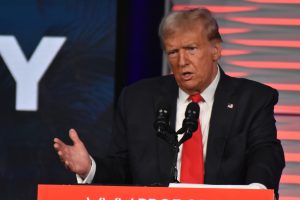As the U.S. presidential campaign heats up, fear of the re-election of former President Donald Trump remains widespread among tech and artificial intelligence (AI) practitioners in China. A bipartisan consensus has emerged in the United States on securing U.S. global leadership in AI, but Chinese AI companies might find that a Kamala Harris administration could be worse than a Trump 2.0.
In short, the United States’ determination to stem China’s AI development and secure U.S. supremacy will continue regardless of the incoming leadership, but a Democratic administration could be more effective in rallying international allies. Trump may be more openly hostile and capricious about a tech war, but a close examination shows that Harris could be effective in curbing Chinese companies’ international expansion through her ability to lean on a multilateral approach.
What we are witnessing today is the securitization of tech competition between the U.S. and China. Concerns over Chinese espionage and growing military capacity have made Chinese tech companies into national security concerns for U.S. policymakers. This trend culminated in the recent TikTok bill, where the tech firm was caught in the geopolitical crossfire, and China is considered as a foreign adversary. Chinese AI firms now are equipped with the mentality to prepare for a long battle.
Comparing Trump to Harris, Trump has certainly proven to be a firm protectionist, and his policies in the past had been introduced in an erratic manner, such as through “Twitter politics.” Further, that approach also inadvertently rattled U.S. allies.
Recall that Trump’s 2020 Executive Order to ban TikTok was launched like a game of rapid-fire, and it was quickly overturned by a federal court for being “arbitrary and capricious.” This time around, facing a more robust legislative effort to ban TikTok, the company is more adept at issuing bolder public responses and formulating better-articulated legal discourse, despite arguably with limited success. Chinese tech companies that had the ambition to list in the United States, such as Shein, also have rerouted to London, facing pressure from both Beijing and Washington.
Most importantly, Trump’s brashness, “America First” rhetoric, and withdrawals from multiple international engagements have diminished allies and partners’ confidence in U.S. commitment during his term. Notably, his decision to withdraw from the Trans-Pacific Partnership left long-term allies and partners in East Asia disappointed and abandoned.
European leaders and the public have shown more trust in conventional and stable U.S. leaders and were unwilling to follow Trump’s orders to ban Chinese tech companies. In fact, trust in the U.S. leadership plummeted to from 77 percent to a stunning 9 percent during the Trump administration. Hence, his Huawei ban in 2019 was initially dismissed by most European leaders, and only gained limited compliance with Washington’s repeated pressure. This raises the question of whether Trump 2.0 will be able to rally his Western allies and combat China together on the AI front, or whether they might choose to collaborate with the Asian challenger?
Harris, on the other hand, will likely sing the same anti-China tune but under a more diplomatic façade with an effective strategy. She will simply put more effort into developing friends and tools than Trump 2.0, internationally speaking. Based on the track record of President Joe Biden, Harris will notably be more adept at leveraging multilateral pressures on China. As Biden’s vice president, Harris was able to attend multiple strategic meetings, such as the ASEAN summits, in place of Biden, forging relationships with countries that are hedging their bets in the China-U.S. competition. Harris is likely to put in more efforts to persuade them to follow the U.S.-led world order.
From Obama’s “pivot” to Asia to the Biden-Harris administration’s “Indo-Pacific Partnership” grand policy schemes, the Democratic leaders have historically had a wider- reaching, well-thought out policy architecture that would recruit other key players globally to manage China at large, which includes its AI development. By contrast, Trump does so unilaterally and sporadically. U.S. allies and partners worldwide are also more receptive to a stable and conventional U.S. leadership approach. This was seen through Biden’s successful wooing of Japan’s Tokyo Electron and the Netherland’s ASML holdings to join the U.S. side in curtailing China’s access to cutting-edge technologies, which have been consistent with its ideal goal of keeping China’s chips development “two generations behind.”
Given Harris’ experience as vice president under Biden, her new administration will likely be more deliberate than Trump 2.0 in devising policy that assures U.S. partners. Furthermore, Harris has already had experience spearheading many AI-related initiatives, such as the Blueprint for an AI Bill of Rights, and the Bletchley Summit last year, which set AI safety on the global governance agenda. We will likely get “more of the same” regarding technology and AI policy under a President Harris. Beyond “vibes” Harris has still a lot more to show on the policy side, but one thing is for sure: her attitude toward China will remain hawkish.
The various U.S. sanctions and Entity Lists that were initiated by Trump and have been extended under Biden have effectively discouraged international investment and technological injection into China to enhance AI innovation. The bipartisan support in ensuring U.S. dominance in AI seems certain. Both Trump 2.0 and a Harris administration would be expected to continue the tech war against China. That said, a comprehensive plan involving an international coalition against Chinese AI development is more likely to be formed by a Harris administration.
Under those circumstances, China may face more restrictions on its access to advanced chips and equipment in developing advanced material, capital and talent in the area. It could potentially be cut off from the global AI ecosystem led by the United States.
So, despite Trump’s strong rhetoric, his administration in practice might end up being less harsh on China than a Harris one. Thus, Trump may, ironically, end up being the lesser of two evils for China’s AI players.































